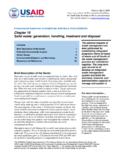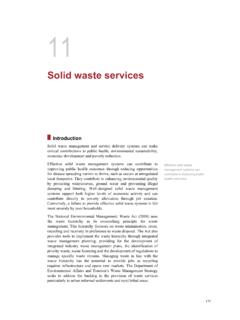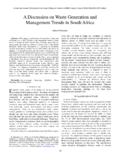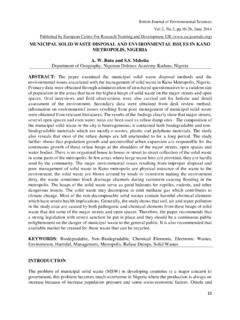Transcription of The Impact of Poor Municipal Solid Waste …
1 International Journal of Applied Science and Technology Vol. 3 No. 4; April 2013 87 The Impact of Poor Municipal Solid Waste management Practices and Sanitation Status on Water Quality and Public Health in Cities of the Least Developed Countries: the Case of Juba, South Sudan Martin Kajokare Karija School of Environmental Studies China University of Geosciences (Wuhan) 388 Lumo Road, Hongshang District Wuhan City, Hubei Province 430074, P. R. China. QI Shihua School of Environmental Studies China University of Geosciences (Wuhan) 388 Lumo Road, Hongshang District Wuhan City, Hubei Province 430074, P.
2 R. China. Yata Samuel Lukaw College of Natural Resources and Environmental Studies Department of Environmental Studies University of Juba Republic of South Sudan. Abstract The inadequate and un-scientific Municipal Solid Waste management practices and the poor state of sanitation in most cities of the developing countries have resulted into the pollution of the environment: contamination of both surface and ground water which is in turn a serious human health risk. This study aimed at investigating the effect of indiscriminate Municipal Solid wastes dumping on water resources with specific focus on fecal coliform contamination in Juba city.
3 Also some physical parameters such as temperature, pH, Total Dissolved Solids (TDS) and Electrical Conductivity (EC) were tested. The results revealed that the River Nile and the streams within Juba are highly contaminated; with an average range of Coliform Forming Unit/100ml (CFU/100ml) for the River Nile. The pH and temperature were within the normal range. TDS showed very high values with range of 47 123 mg/100ml which is far beyond the USEPA and WHO recommended 500 ml/L. The EC was not so high; ranges between 59 s - 201 s/cm which is slightly above the recommended 160 s/cm.
4 For the streams, the CFU/100ml was found to be abnormally high ranging from 11, CFU/100ml. TDS and EC were also high ranging from 41 868 mg/100ml and 15 1761 s/cm respectively. The pH and the temperature showed normality. The CFU/100ml readings of the boreholes and the well were within the range of 0 26 CFU/100ml. Out of the eleven sampled boreholes, six were clean with 0 CFU/100ml the EPA and WHO recommended value but the other five and the well were contaminated. The TDS and EC were extremely high ranging between 481 823 mg/100ml and 1032 1775 s/cm respectively.
5 PH and temperature were within normal range. The study concluded that the poor Municipal Solid Waste management in Juba is posing high risk to the human health and the environment. Key words: Municipal Solid Waste , Sanitation, Fecal Coliform, Water Contamination, CFU/100ml 1. Introduction The current Municipal Solid wastes management practices especially collecting, processing and disposing are considered to be inefficient in the developing countries. The typical problems are low collection coverage and irregular collection services, crude open dumping and burning without air and water pollution control, the breeding of flies and vermin; and the handling and control of informal Waste picking or scavenging activities (Bartone, 1995).
6 Center for Promoting Ideas, USA 88 Generally, one to two thirds of the Municipal Solid wastes generated in the cities of the developing countries are not collected (World Resources Institute et al., 1996). As a result, the uncollected Waste , which is often also mixed with human and animal excreta, is dumped indiscriminately along the streets and in drains, so contributing to flooding, breeding of insect and rodent vectors and the spread of diseases (Cointreau, 1982; UNEP-IETC, 1996; Zurbrugg, 2002).
7 The uncontrolled and un-scientific dumping of Municipal Solid wastes has brought about a rising number of incidents of hazards to human health; contamination of both surface and ground water which is in turn a serious human health risk. Surprisingly, the indiscriminate dumping of Municipal Solid wastes in water bodies sources and low lying areas without consideration of its effect on the environment is a common practice in many cities of the developing countries (Medina, 2010; Zurbrugg, 2003; Da Zhu et al., 2008).
8 All these Waste management malpractices coupled with the poor state of sanitation make things extremely unbelievable to be happening in the cities of the least Developed Countries. Sanitation refers to the provision of facilities and services for the safe disposal of human Waste in toilets, or versions of toilets such as latrines. Most developed countries are well-equipped with flush toilets, however in developing countries, sanitation is based around much more basic facilities that are often little more than a hole in the ground (World Bank, 2012).
9 In 2010, an estimated billion people worldwide were still without improved sanitation. This means that it is unlikely that the world will meet the MDG sanitation target 10 (Halve the proportion of the population without sustainable access to safe drinking water and basic sanitation) by 2015: although encouraging progress is being made (WHO and UNICEF, 2006; UNICEF and WHO, 2012). Despite this progress, the situation remains horrible in most of Sub-Sahara African countries: this is what (UNICEF and WHO, 2012) described as NOT ON TRACK countries; for example, the World s newest country the Republic of South Sudan with its capital city Juba.
10 Therefore, this study tries to determine the degree of the Impact of poor Municipal Solid Waste management practices and sanitation programs on the water quality and public health in Juba city. 2. Materials and Methods The Study Area Juba is the capital city of the newest world s country the Republic of South Sudan in North East Africa. The city is located within the southern part of South Sudan in Central Equatoria State along the western bank of the River Nile. Its geographical coordinates are 4 51' 0" North and 31 37' 0" East (Amanda, 2011).











